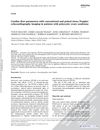 18 citations,
January 2015 in “Journal of obesity and weight loss therapy”
18 citations,
January 2015 in “Journal of obesity and weight loss therapy” Eating less starch and dairy helped overweight women with PCOS lose weight and improve symptoms.
 16 citations,
July 2020 in “Health and Quality of Life Outcomes”
16 citations,
July 2020 in “Health and Quality of Life Outcomes” Women with Polycystic Ovary Syndrome (PCOS) have a lower health-related quality of life, especially those with an anovulatory phenotype, and may need specific interventions to improve it.
 16 citations,
May 2019 in “Hormone and Metabolic Research”
16 citations,
May 2019 in “Hormone and Metabolic Research” Selenium might help with insulin resistance and cholesterol in PCOS, but more research is needed to confirm its benefits.
 16 citations,
December 2017 in “Journal of Pediatric and Adolescent Gynecology”
16 citations,
December 2017 in “Journal of Pediatric and Adolescent Gynecology” Different diagnostic criteria greatly affect PCOS diagnosis rates in teenagers.
 16 citations,
December 2007 in “Expert Review of Pharmacoeconomics & Outcomes Research”
16 citations,
December 2007 in “Expert Review of Pharmacoeconomics & Outcomes Research” PCOS lowers quality of life, causing issues like obesity, infertility, and menstrual problems.
 15 citations,
April 2018 in “Revista Brasileira de Ginecologia e Obstetrícia”
15 citations,
April 2018 in “Revista Brasileira de Ginecologia e Obstetrícia” Insulin resistance is common in PCOS patients and linked to obesity and increased cardiovascular risk.
 15 citations,
December 2016 in “Revista Da Associacao Medica Brasileira”
15 citations,
December 2016 in “Revista Da Associacao Medica Brasileira” Polycystic ovary syndrome is a common hormonal disorder in women, linked to increased risk of metabolic and heart diseases, and needs more research for better understanding and treatment.
 15 citations,
October 2015 in “PLOS ONE”
15 citations,
October 2015 in “PLOS ONE” The Chinese version of the PCOS quality of life questionnaire is reliable and valid for Chinese-speaking women with PCOS.
 15 citations,
October 2011 in “Gynecological Endocrinology”
15 citations,
October 2011 in “Gynecological Endocrinology” Obesity changes androgen levels in women with PCOS, leading to higher testosterone relative to androstenedione.
 14 citations,
October 2016 in “Physiological Research”
14 citations,
October 2016 in “Physiological Research” Alfacalcidiol and metformin together lowered testosterone in women with PCOS, but did not significantly improve acne, hair growth, or pregnancy rates.
 14 citations,
September 2014 in “Journal of Pediatric and Adolescent Gynecology”
14 citations,
September 2014 in “Journal of Pediatric and Adolescent Gynecology” Irregular menstrual cycles in teenagers are linked to a higher risk of polycystic ovary syndrome and metabolic syndrome.
 13 citations,
April 2015 in “Human Reproduction”
13 citations,
April 2015 in “Human Reproduction” Obese Hispanic women with PCOS are at higher risk for metabolic problems than non-Hispanic white women.
 11 citations,
October 2018 in “Hormone and Metabolic Research”
11 citations,
October 2018 in “Hormone and Metabolic Research” Women with PCOS have similar bone density to healthy women, but those who are obese have higher bone density at some body sites.
 11 citations,
November 2017 in “Electronic physician”
11 citations,
November 2017 in “Electronic physician” Depression severity is not linked to PCOS markers like BMI, insulin resistance, or testosterone levels.
 11 citations,
January 2012 in “International Journal of Endocrinology”
11 citations,
January 2012 in “International Journal of Endocrinology” Insulin resistance is found in 20% of Thai women with PCOS, with age, waist size, skin changes, and abnormal blood fats increasing the risk.
 10 citations,
February 2017 in “Hormone Molecular Biology and Clinical Investigation”
10 citations,
February 2017 in “Hormone Molecular Biology and Clinical Investigation” Metformin effectively improves metabolic symptoms in women with PCOS, while alfacalcidiol does not have a significant impact.
 10 citations,
September 2015 in “Gynecological Endocrinology”
10 citations,
September 2015 in “Gynecological Endocrinology” Both treatments reduced excessive hair growth in PCOS, but there was no difference in weight, hair score, hormone levels, or insulin resistance.
 9 citations,
March 2019 in “Anthropology and Medicine”
9 citations,
March 2019 in “Anthropology and Medicine” PCOS in India is linked to broader sociocultural and environmental changes, not just diet and exercise.
 9 citations,
May 2010 in “Gynecological Endocrinology”
9 citations,
May 2010 in “Gynecological Endocrinology” Young women with PCOS and no other heart risk factors have normal heart function.
 8 citations,
May 2021 in “Reproductive Biology and Endocrinology”
8 citations,
May 2021 in “Reproductive Biology and Endocrinology” Different levels of anti-Müllerian hormone can help diagnose polycystic ovary syndrome in women of different ages.
 8 citations,
April 2017 in “Medical Hypotheses”
8 citations,
April 2017 in “Medical Hypotheses” Men with early balding may have hormonal imbalances similar to women with PCOS and could benefit from similar treatments.
 7 citations,
May 2019 in “Journal of the Formosan Medical Association”
7 citations,
May 2019 in “Journal of the Formosan Medical Association” HSD3B1 gene variant and being overweight linked to hair loss in women with polycystic ovary syndrome.
 7 citations,
February 2019 in “Journal of gynecology obstetrics and human reproduction”
7 citations,
February 2019 in “Journal of gynecology obstetrics and human reproduction” People with polycystic ovary syndrome (PCOS) are more likely to have higher levels of depression and anxiety, but their personality traits are similar to those without PCOS.
 7 citations,
March 2017 in “Medical Hypotheses”
7 citations,
March 2017 in “Medical Hypotheses” Aquaporins could be new drug targets for treating polycystic ovary syndrome.
 6 citations,
June 2017 in “Reproductive Biomedicine Online”
6 citations,
June 2017 in “Reproductive Biomedicine Online” Chinese women with PCOS have higher androgen levels, which change with age and weight.
 5 citations,
June 2010 in “Endocrinología y Nutrición”
5 citations,
June 2010 in “Endocrinología y Nutrición” Diagnosing and managing PCOS in teens is hard, but early diagnosis and lifestyle changes are key, and more research is needed for long-term health.
 4 citations,
January 2022 in “Open Health”
4 citations,
January 2022 in “Open Health” Eating healthy, exercising, and changing behaviors are the best first steps to treat Polycystic Ovary Syndrome (PCOS).
 4 citations,
April 2017 in “International journal of reproduction, contraception, obstetrics and gynecology”
4 citations,
April 2017 in “International journal of reproduction, contraception, obstetrics and gynecology” The study concluded that a higher waist-hip ratio significantly increases the risk of metabolic syndrome in women with PCOS.
 3 citations,
March 2018 in “Journal of Continuing Education in Nursing”
3 citations,
March 2018 in “Journal of Continuing Education in Nursing” Continuing education programs significantly increased rural nurse practitioners' knowledge about PCOS.
 2 citations,
June 2022 in “Scientific reports”
2 citations,
June 2022 in “Scientific reports” Women with PCOS have higher hair cortisol levels, which are linked to worse metabolic and inflammatory conditions.






























